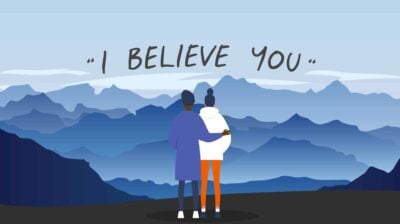spunout’s guide to end violence against women
There are steps that everyone can take to build a safer society for women in this country.

267 women have died violently between 1996- to 2024 in Ireland. 87% of these women, where the case has been resolved, were killed by a man known to them and 13% were killed by a stranger. Hearing about continuous acts of violence committed by men against women is frightening and upsetting. It can also leave people feeling confused and powerless, unsure of why things like this happen or what can be done to prevent similar cases in the future.
The truth is, preventing violent acts is about more than just being personally non-violent. There are steps that everyone can take to build a safer society for women in this country.
Violent acts against women don’t happen in a vacuum, meaning it’s all connected and part of a much wider problem. These acts are built on top of toxic beliefs and attitudes that have a long history and are formed and repeated within family and friendship groups, at the community level, and within wider society. We must all work to educate ourselves about the harmful mentalities and behaviours that reinforce violence against women and actively behave in ways that make our society safer.
Ways to challenge toxic masculinity
Toxic masculinity refers to a collection of unhealthy beliefs, attitudes, and behaviours that many people associate with being masculine. Some of these traits can reinforce anger and aggression, while others can reinforce sexist beliefs. These are some of the ways that toxic masculinity is linked to men committing acts of violence towards women. Here are some articles that can help you learn more.
- What is toxic masculinity
- How to challenge toxic masculinity
- Why we all need to address sexism in our lives
- How to make my school a safe space for LGBTI+ people
- What to do when you see bullying online
- Mental health supports for men in Ireland
- Am I an abusive person?
Intervene against sexual violence
Sexual violence is common and can be experienced by anyone, and we all have a responsibility to look out for each other. Helping someone in a situation of sexual violence can make a big difference. It is also important that we all understand what consent means and why it’s important when it comes to sex. Here are some articles that can help you learn more.
- How to help stop sexual violence
- Talking about consent when you are in a relationship
- 6 reasons to intervene against sexual violence
- Why men are key to stopping sexual harassment
- What to do if your partner doesn’t want to have sex
Be actively anti-racist
Racism is deeply rooted in the structures of our society, giving privilege to mainly white people and which are biassed against people of colour. Women from ethnic minority groups in Ireland are at an even higher risk of experiencing gender-based violence. It is vital that we all work to educate ourselves about racism and actively behave in ways that are anti-racist.
- How to react to racism online
- What to do if you witness racism
- What is white privilege
- How to educate yourself about racism
Feeling overwhelmed and want to talk to someone?
- Get anonymous support 24/7 with our text message support service
- Connect with a trained volunteer who will listen to you, and help you to move forward feeling better
- Whatsapp us now or free-text SPUNOUT to 50808 to begin.
- Find out more about our text message support service
If you are a customer of the 48 or An Post network or cannot get through using the ‘50808’ short code please text HELLO to 086 1800 280 (standard message rates may apply). Some smaller networks do not support short codes like ‘50808’.






